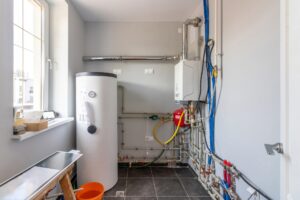Stuffy Air: Causes, Symptoms, Solutions

Stuffy air is a term that’s widely used in our area. While people can mean a variety of different things when they say that air is “stuffy,” there’s usually one main point: that there’s dust or something in the air that makes it hard to breathe. Usually, what follows someone saying that the air feels stuffy is the desire to open a window for some freshness. But in many areas, especially in Westchester County, that might not be a good idea.
Many of our customers live in buildings or homes that sit right outside of a garbage loading area, or where vehicles are constantly stalled in traffic. Opening a window might make the air smell even worse. So what can be done?
Well, an air filtration system in Westchester County, NY is going to go a long way in preserving the quality of a home’s air without the need for allowing outside contaminants to get in.
The Seal of a Home Isn’t Helping
Homes are tightly sealed today, which means that it’s hard for air to escape. This is good news during the wintertime, since cold air won’t infiltrate a home and the warmth that’s created by the heating system will remain indoors. However, this is bad news for indoor air quality.
All of the contaminants that come from the materials in a home (like cooking smoke, dust, and pet dander) can remain inside with no real way of being removed. This is ultimately what leads to air feeling stuffy or uncomfortable. Eventually, all of those contaminants can lead to a dramatic decrease in air quality and comfort, which then poses a new problem: how do we get rid of contaminants?
That’s where an air filtration system comes into play.
How an Air Filtration System Works
Air filtration systems work by using an air filter to siphon out particles of a particular size or greater. Think of it like a strainer that can be used while draining pasta: it lets the water out but keeps the pasta in! An air filter allows air to flow through it while catching the particles that might be making the air feel stuffy, like debris, dust, and dander.
Air filter strength depends on the type of filter and the MERV rating. MERV stands for minimum efficiency reporting value, and it’s a numerical measurement to tell how strong a filter is going to be at removing particles of a given size. For instance, residential spaces can be in pretty good shape with a MERV 10 filter, whereas a hospital is required to use a HEPA filter, which is MERV 17+. Talk with a professional to find the right sized filter to help with contaminants.
Match One With an Air Purifier
It’s also a good idea to match an air filtration system with an air purifier. Air purifiers eliminate biological contaminants, usually with a UV light. This can eliminate viruses, bacteria, and mold spores, while the filter catches inorganic particles of a certain size. Both of these systems can work together to give maximum protection.
Contact Yost & Campbell Heating, Cooling & Generators for an air filtration system or air purifier today!







